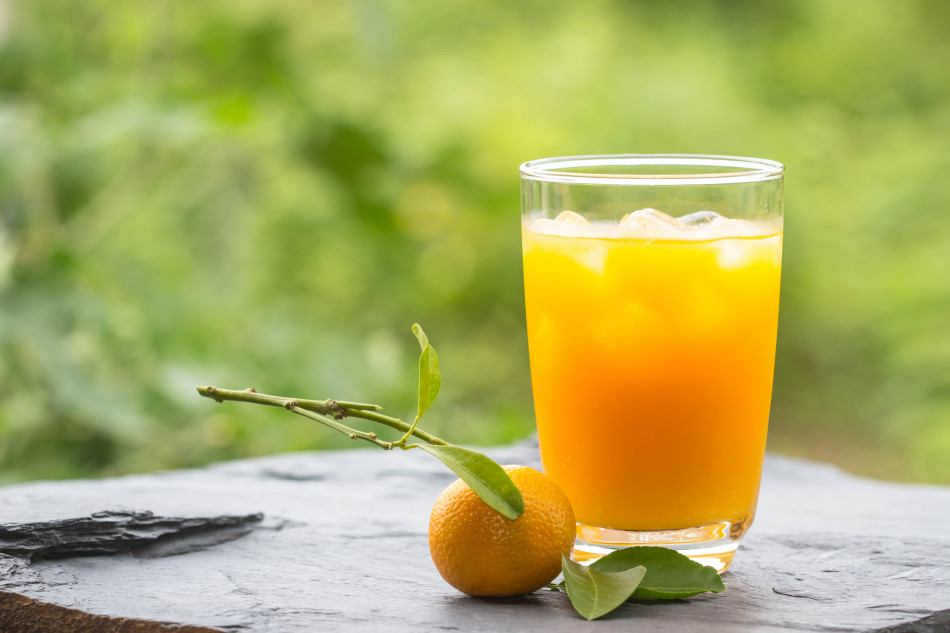What are the benefits of drinking orange juice?

What are the benefits of drinking orange juice?
2 min read
Plant foods are important sources of vitamins and minerals in our diet. This is why experts recommend that we should all eat a balanced diet that contains a colourful variety of fruit and vegetables.
Oranges and orange juice are definitely part of such a balanced diet. In particular, they're sources of vitamin C, folate and potassium which contribute to our health in many different ways:
Immune defense
Both vitamin C and folate play an important role in our immune system, which is the body's natural defense against viruses and pathogenic bacteria. Sufficient intakes of vitamin C and folate ensure that our immune system functions within the optimal range. A glass of orange juice (150 ml) at breakfast contains 68 mg of vitamin C and 32 mcg of folate. This represents over 80% of the daily recommendation for vitamin C and more than 15% of the recommendation for folate.
Healthy bones, skin and teeth
Vitamin C is probably best known for its role in the maintenance of normal skin, bones and teeth. This is because vitamin C is used in the body to make collagen, a vital structural protein. In past centuries, sailors often suffered from a disease called scurvy during long voyages, characterised by bleeding of the skin and gums. Long before vitamin C was discovered, a British doctor in the 1700s found that giving citrus fruits, such as limes or lemons, to sailors solved the problem of scurvy. This is why British sailors came to be known as 'limeys'!
Tiredness and fatigue
Vitamin C and folate are known to contribute to the reduction of tiredness and fatigue. This may be because folate is involved in the release of energy from foods, while vitamin C helps protect body cells from oxidative damage. As neither nutrient can be made in the body, we need a regular supply from our diets.
Iron absorption
Iron is another essential nutrient that is important for many functions in the body. Although orange juice is not a source of iron, vitamin C helps the body to absorb iron from our diet, particularly from fortified foods or plant sources. That's why it's best to drink orange juice with a meal.
Protection from oxidative stress
Vitamin C is part of our antioxidant defense system. This is a complex network involving antioxidants produced by the body and those found in the diet. If we had no antioxidants, our body cells and DNA would come under constant attack from free radicals – chemicals which are made during normal metabolism or stimulated by stress, inflammation or disease. Vitamin C functions as a water-soluble antioxidant and plays a major role in neutralising free radicals. This activity protects our cells and DNA from oxidative damage.
Nervous system
Both vitamin C and folate play important roles in the maintenance of psychological functions. Vitamin C acts as a catalyst for enzymes that are needed to make substances to help our nervous system work efficiently. Potassium is an essential element for our nervous system and supports normal muscle function.
Formation of blood and tissues
During pregnancy, folate is essential for maternal tissue growth, for the formation of amino acids – the building blocks of our proteins – and for normal blood cells. Folate is key for helping cells to divide and replicate normally, which is why women are advised to take a folic acid supplement when planning a pregnancy (folic acid is the supplemental form of folate).
Blood pressure
The potassium found in orange juice is not only important for normal muscle function but also helps to maintain a healthy blood pressure. There is general agreement that a good intake of potassium from fruit, vegetables and seafood can help maintain a healthy blood pressure, and this is recommended by several international medical associations.
Conclusions
Orange juice is an important and convenient source of vitamin C, folate and potassium. One daily glass of orange juice contains the nutrient equivalent of one to two oranges and is a healthy drink to accompany breakfast or other meals.
